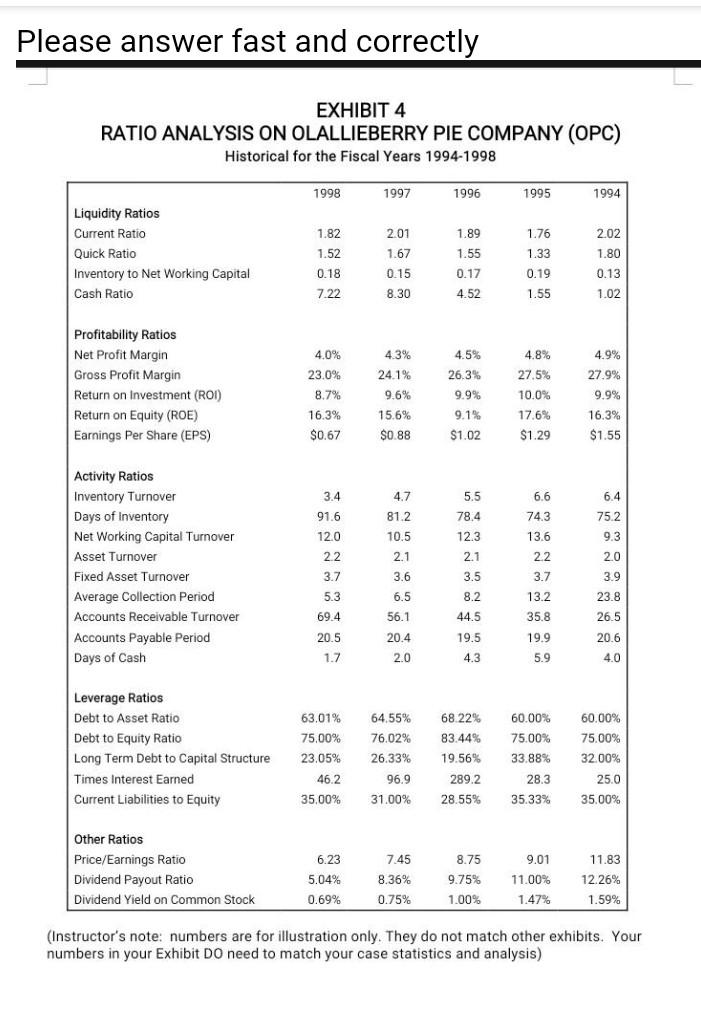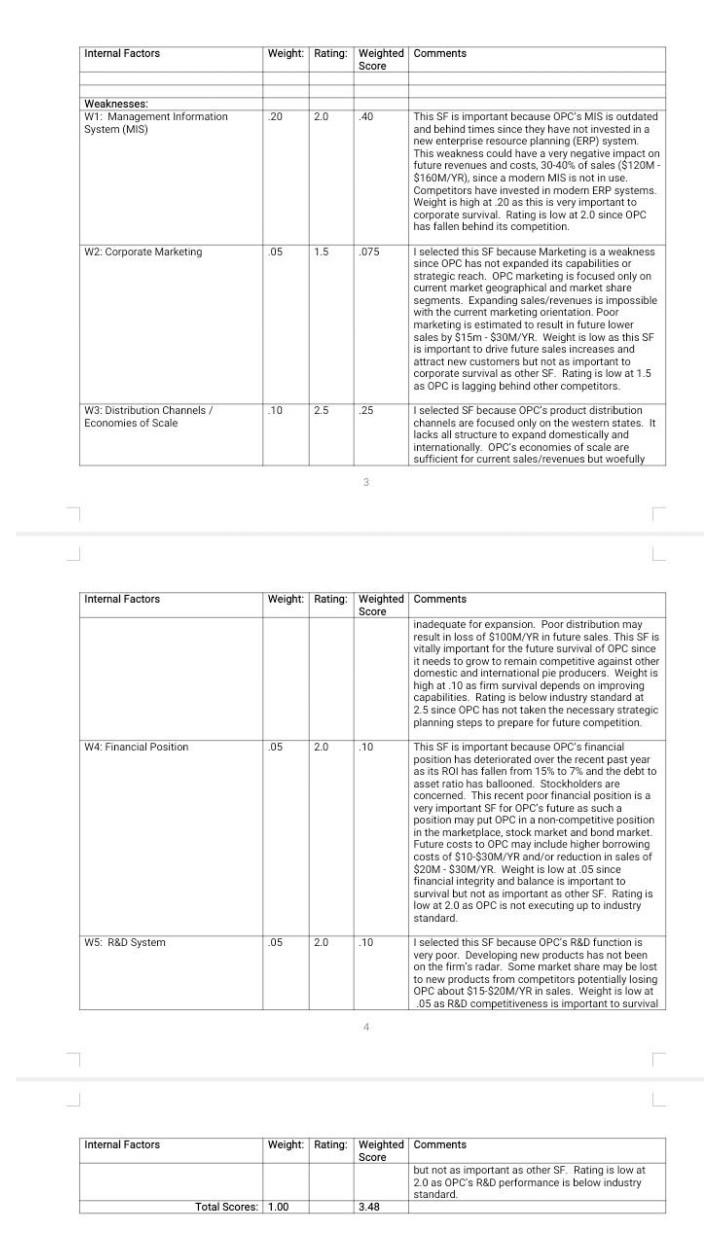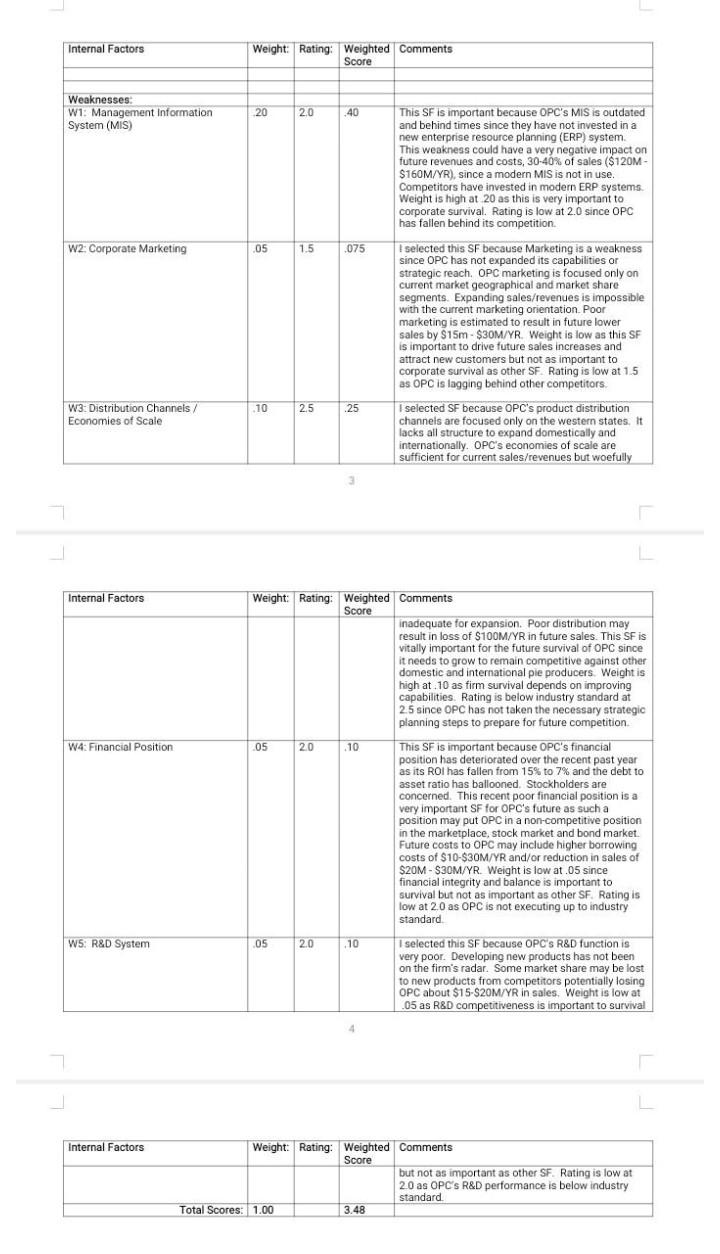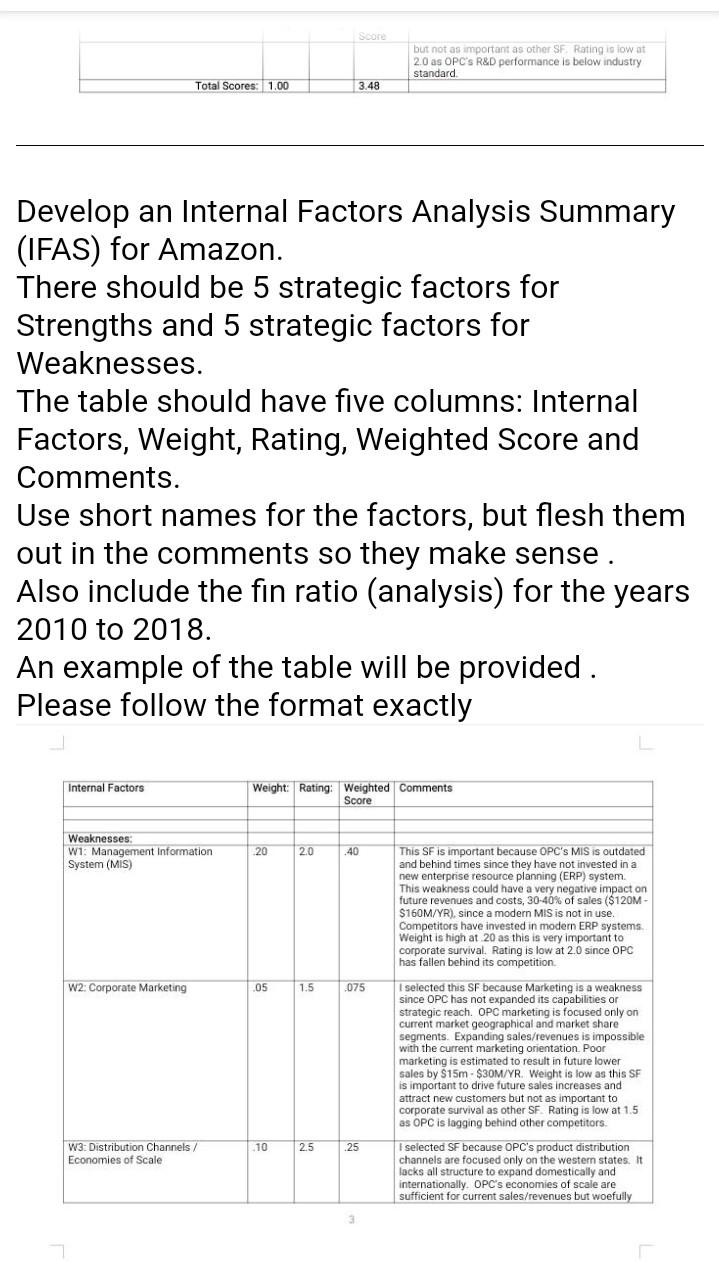Answered step by step
Verified Expert Solution
Question
1 Approved Answer
Please answer fast and correctly EXHIBIT 4 (Instructor's note: numbers are for illustration only. They do not match other exhibits. Your numbers in your Exhibit




Please answer fast and correctly EXHIBIT 4 (Instructor's note: numbers are for illustration only. They do not match other exhibits. Your numbers in your Exhibit DO need to match your case statistics and analysis) \begin{tabular}{|c|c|c|c|c|} \hline Internal Factors & Weight: & Rating: & \begin{tabular}{l} Weighted \\ Score \end{tabular} & Comments \\ \hline & & & & \\ \hline \multicolumn{5}{|l|}{ Weaknesses: } \\ \hline \begin{tabular}{l} W1: Management information \\ System (MiS) \end{tabular} & .20 & 2.0 & .40 & \begin{tabular}{l} This SF is important because OPC's MIS is outdated \\ and behind times since they have not invested in a \\ new enterprise resource planning (ERP) system. \\ This weakness could have a very negative impact on \\ future revenues and costs, 3040% of sales ( $120M \\ $160M/YR ), since a modern MIS is not in use. \\ Competitors have invested in modern ERP systems. \\ Weight is high at 20 as this is very important to \\ corporate survival. Rating is low at 2.0 since OPC \\ has fallen behind its competition. \end{tabular} \\ \hline W2: Corporate Marketing & .05 & 1.5 & .075 & \begin{tabular}{l} I selected this SF because Marketing is a weakness \\ since OPC has not expanded its capabilities or \\ strategic reach. OPC marketing is focused only on \\ current market geographical and market share \\ segments. Expanding sales/revenues is impossible \\ with the current marketing orientation. Poor \\ marketing is estimated to result in future lower \\ sales by $15m - \$30M/YR. Weight is low as this SF \\ is important to drive future sales increases and \\ attract new customers but not as important to \\ corporate survival as other SF. Rating is low at 1.5 \\ as OPC is lagging behind other competitors. \end{tabular} \\ \hline \begin{tabular}{l} W3: Distribution Channels / \\ Economies of Scale \end{tabular} & 10 & 25 & .25 & \begin{tabular}{l} I selected SF because OPC's product distribution \\ channels are focused only on the western states. It \\ lacks all structure to expand domestically and \\ internationally. OPC's economies of scale are \\ sufficient for current sales/revenues but woefully \end{tabular} \\ \hline \end{tabular} 3 \begin{tabular}{|c|c|c|c|c|} \hline Internal Factors & Weight: & Rating: & \begin{tabular}{l} Weighted \\ Score \end{tabular} & Comments \\ \hline & & & & \begin{tabular}{l} inadequate for expansion. Poor distribution may \\ result in loss of $100M/YR in future sales. This SF is \\ vitally important for the future survival of OPC since \\ it needs to grow to remain competitive against other \\ domestic and international pie producers. Weight is \\ high at. 10 as firm survival depends on improving \\ capabilities. Rating is below industry standard at \\ 2.5 since OPC has not taken the necessary strategic \\ planning steps to prepare for future competition. \end{tabular} \\ \hline W4: Financial Position & .05 & 2.0 & .10 & \begin{tabular}{l} This SF is important because OPC's financial \\ position has deteriorated over the recent past year \\ as its ROI has fallen from 15% to 7% and the debt to \\ asset ratio has ballooned. Stockholders are \\ concerned. This recent poor financial position is a \\ very important SF for OPC's future as such a \\ position may put OPC in a non-competitive position \\ in the marketplace, stock market and bond market. \\ Future costs to OPC may include higher borrowing \\ costs of $10$30M/YR and/or reduction in sales of \\ $20M$30M/YR. Weight is low at. 05 since \\ financial integrity and balance is important to \\ survival but not as important as other SF. Rating is \\ low at 2.0 as OPC is not executing up to industry \\ standard. \end{tabular} \\ \hline W5: R\&D System & .05 & 2.0 & -10 & \begin{tabular}{l} I selected this SF because OPC's R8D function is \\ very poor. Developing new products has not been \\ on the firm's radar. Some market share may be lost \\ to new products from competitors potentially losing \\ OPC about $15$20M/YR in sales. Weight is low at \\ .05 as R\&D competitiveness is important to survival \end{tabular} \\ \hline \end{tabular} 4 \begin{tabular}{|r|l|l|l|l|} \hline Internal Factors & Weight: & Rating: & \begin{tabular}{l} Weighted \\ Score \end{tabular} & Comments \\ \hline & & & \begin{tabular}{l} but not as important as other SF. Rating is low at \\ 2.0 as OPC's R\&D performance is below industry \\ standard. \end{tabular} \\ \hline Total Scores: & 1.00 & & 3.48 & \\ \hline \end{tabular} \begin{tabular}{|c|c|c|c|c|} \hline Internal Factors & Weight: & Rating: & \begin{tabular}{l} Weighted \\ Score \end{tabular} & Comments \\ \hline & & & & \\ \hline \multicolumn{5}{|l|}{ Weaknesses: } \\ \hline \begin{tabular}{l} W1: Management information \\ System (MIS) \end{tabular} & 20 & 2.0 & .40 & \begin{tabular}{l} This SF is important because OPC's MIS is outdated \\ and behind times since they have not invested in a \\ new enterprise resource planning (ERP) system. \\ This weakness could have a very negative impact on \\ future revenues and costs, 3040% of sales ( $120M - \\ \$160M/YR), since a modern MIS is not in use. \\ Competitors have invested in modern ERP systems. \\ Weight is high at. 20 as this is very important to \\ corporate survival. Rating is low at 2.0 since OPC \\ has fallen behind its competition. \end{tabular} \\ \hline W2: Corporate Marketing & .05 & 1.5 & .075 & \begin{tabular}{l} I selected this SF because Marketing is a weakness \\ since OPC has not expanded its capabilities or \\ strategic reach. OPC marketing is focused only on \\ current market geographical and market share \\ segments. Expanding sales/revenues is impossible \\ with the current marketing orientation. Poor \\ marketing is estimated to result in future lower \\ sales by $15m - \$30M/YR. Weight is low as this SF \\ is important to drive future sales increases and \\ attract new customers but not as important to \\ corporate survival as other SF. Rating is low at 1.5 \\ as OPC is lagging behind other competitors. \end{tabular} \\ \hline \begin{tabular}{l} W3: Distribution Channels / \\ Economies of Scale \end{tabular} & .10 & 2.5 & .25 & \begin{tabular}{l} I selected SF because OPC's product distribution \\ channeis are focused only on the western states. It \\ lacks all structure to expand domestically and \\ internationally. OPC's economies of scale are \\ sufficient for current sales/revenues but woefully \end{tabular} \\ \hline \end{tabular} 3 \begin{tabular}{|c|c|c|c|c|} \hline Internal Factors & Weight: & Rating: & \begin{tabular}{l} Weighted \\ Score \end{tabular} & Comments \\ \hline & & & & \begin{tabular}{l} inadequate for expansion. Poor distribution may \\ result in loss of S100M/YR in future sales. This SF is \\ vitally important for the future survival of OPC since \\ it needs to grow to remain competitive against other \\ domestic and international pie producers. Weight is \\ high at. 10 as firm survival depends on improving \\ capabilities. Rating is below industry standard at \\ 2.5 since OPC has not taken the necessary strategic \\ planning steps to prepare for future competition. \end{tabular} \\ \hline W4: Financial Position & .05 & 20 & .10 & \begin{tabular}{l} This SF is important because OPC's financial \\ position has deteriorated over the recent past year \\ as its ROI has fallen from 15% to 7% and the debt to \\ asset ratio has ballooned. Stockholders are \\ concerned. This recent poor financial position is a \\ very important SF for OPC's future as such a \\ position may put OPC in a non-competitive position \\ in the marketplace, stock market and bond market. \\ Future costs to OPC may include higher borrowing \\ costs of $10$30M/YR and/or reduction in sales of \\ $20M$30M/YR. Weight is low at. 05 since \\ financial integrity and balance is important to \\ survival but not as important as other SF. Rating is \\ low at 2.0 as OPC is not executing up to industry \\ standard. \end{tabular} \\ \hline W5: R\&D System & .05 & 2.0 & .10 & \begin{tabular}{l} I selected this SF because OPC's R\&D function is \\ very poor. Developing new products has not been \\ on the firm's radar. Some market share may be lost \\ to new products from competitors potentially losing \\ OPC about \$15-S20M/YR in sales. Weight is low at \\ .05 as R 8D competitiveness is important to survival \end{tabular} \\ \hline \end{tabular} \begin{tabular}{|l|l|l|l|l|} \hline Internal Factors & Weight: & Rating: & \begin{tabular}{l} Weighted \\ Score \end{tabular} & Comments \\ \hline & & & \begin{tabular}{l} but not as important as other SF. Rating is low at \\ 2.0 as OPC's R\&D performance is below industry \\ standard. \end{tabular} \\ \hline Total Scores: & 1.00 & & 3.48 & \\ \hline \end{tabular} Develop an Internal Factors Analysis Summary (IFAS) for Amazon. There should be 5 strategic factors for Strengths and 5 strategic factors for Weaknesses. The table should have five columns: Internal Factors, Weight, Rating, Weighted Score and Comments. Use short names for the factors, but flesh them out in the comments so they make sense . Also include the fin ratio (analysis) for the years 2010 to 2018. An example of the table will be provided . Please follow the format exactly Please answer fast and correctly EXHIBIT 4 (Instructor's note: numbers are for illustration only. They do not match other exhibits. Your numbers in your Exhibit DO need to match your case statistics and analysis) \begin{tabular}{|c|c|c|c|c|} \hline Internal Factors & Weight: & Rating: & \begin{tabular}{l} Weighted \\ Score \end{tabular} & Comments \\ \hline & & & & \\ \hline \multicolumn{5}{|l|}{ Weaknesses: } \\ \hline \begin{tabular}{l} W1: Management information \\ System (MiS) \end{tabular} & .20 & 2.0 & .40 & \begin{tabular}{l} This SF is important because OPC's MIS is outdated \\ and behind times since they have not invested in a \\ new enterprise resource planning (ERP) system. \\ This weakness could have a very negative impact on \\ future revenues and costs, 3040% of sales ( $120M \\ $160M/YR ), since a modern MIS is not in use. \\ Competitors have invested in modern ERP systems. \\ Weight is high at 20 as this is very important to \\ corporate survival. Rating is low at 2.0 since OPC \\ has fallen behind its competition. \end{tabular} \\ \hline W2: Corporate Marketing & .05 & 1.5 & .075 & \begin{tabular}{l} I selected this SF because Marketing is a weakness \\ since OPC has not expanded its capabilities or \\ strategic reach. OPC marketing is focused only on \\ current market geographical and market share \\ segments. Expanding sales/revenues is impossible \\ with the current marketing orientation. Poor \\ marketing is estimated to result in future lower \\ sales by $15m - \$30M/YR. Weight is low as this SF \\ is important to drive future sales increases and \\ attract new customers but not as important to \\ corporate survival as other SF. Rating is low at 1.5 \\ as OPC is lagging behind other competitors. \end{tabular} \\ \hline \begin{tabular}{l} W3: Distribution Channels / \\ Economies of Scale \end{tabular} & 10 & 25 & .25 & \begin{tabular}{l} I selected SF because OPC's product distribution \\ channels are focused only on the western states. It \\ lacks all structure to expand domestically and \\ internationally. OPC's economies of scale are \\ sufficient for current sales/revenues but woefully \end{tabular} \\ \hline \end{tabular} 3 \begin{tabular}{|c|c|c|c|c|} \hline Internal Factors & Weight: & Rating: & \begin{tabular}{l} Weighted \\ Score \end{tabular} & Comments \\ \hline & & & & \begin{tabular}{l} inadequate for expansion. Poor distribution may \\ result in loss of $100M/YR in future sales. This SF is \\ vitally important for the future survival of OPC since \\ it needs to grow to remain competitive against other \\ domestic and international pie producers. Weight is \\ high at. 10 as firm survival depends on improving \\ capabilities. Rating is below industry standard at \\ 2.5 since OPC has not taken the necessary strategic \\ planning steps to prepare for future competition. \end{tabular} \\ \hline W4: Financial Position & .05 & 2.0 & .10 & \begin{tabular}{l} This SF is important because OPC's financial \\ position has deteriorated over the recent past year \\ as its ROI has fallen from 15% to 7% and the debt to \\ asset ratio has ballooned. Stockholders are \\ concerned. This recent poor financial position is a \\ very important SF for OPC's future as such a \\ position may put OPC in a non-competitive position \\ in the marketplace, stock market and bond market. \\ Future costs to OPC may include higher borrowing \\ costs of $10$30M/YR and/or reduction in sales of \\ $20M$30M/YR. Weight is low at. 05 since \\ financial integrity and balance is important to \\ survival but not as important as other SF. Rating is \\ low at 2.0 as OPC is not executing up to industry \\ standard. \end{tabular} \\ \hline W5: R\&D System & .05 & 2.0 & -10 & \begin{tabular}{l} I selected this SF because OPC's R8D function is \\ very poor. Developing new products has not been \\ on the firm's radar. Some market share may be lost \\ to new products from competitors potentially losing \\ OPC about $15$20M/YR in sales. Weight is low at \\ .05 as R\&D competitiveness is important to survival \end{tabular} \\ \hline \end{tabular} 4 \begin{tabular}{|r|l|l|l|l|} \hline Internal Factors & Weight: & Rating: & \begin{tabular}{l} Weighted \\ Score \end{tabular} & Comments \\ \hline & & & \begin{tabular}{l} but not as important as other SF. Rating is low at \\ 2.0 as OPC's R\&D performance is below industry \\ standard. \end{tabular} \\ \hline Total Scores: & 1.00 & & 3.48 & \\ \hline \end{tabular} \begin{tabular}{|c|c|c|c|c|} \hline Internal Factors & Weight: & Rating: & \begin{tabular}{l} Weighted \\ Score \end{tabular} & Comments \\ \hline & & & & \\ \hline \multicolumn{5}{|l|}{ Weaknesses: } \\ \hline \begin{tabular}{l} W1: Management information \\ System (MIS) \end{tabular} & 20 & 2.0 & .40 & \begin{tabular}{l} This SF is important because OPC's MIS is outdated \\ and behind times since they have not invested in a \\ new enterprise resource planning (ERP) system. \\ This weakness could have a very negative impact on \\ future revenues and costs, 3040% of sales ( $120M - \\ \$160M/YR), since a modern MIS is not in use. \\ Competitors have invested in modern ERP systems. \\ Weight is high at. 20 as this is very important to \\ corporate survival. Rating is low at 2.0 since OPC \\ has fallen behind its competition. \end{tabular} \\ \hline W2: Corporate Marketing & .05 & 1.5 & .075 & \begin{tabular}{l} I selected this SF because Marketing is a weakness \\ since OPC has not expanded its capabilities or \\ strategic reach. OPC marketing is focused only on \\ current market geographical and market share \\ segments. Expanding sales/revenues is impossible \\ with the current marketing orientation. Poor \\ marketing is estimated to result in future lower \\ sales by $15m - \$30M/YR. Weight is low as this SF \\ is important to drive future sales increases and \\ attract new customers but not as important to \\ corporate survival as other SF. Rating is low at 1.5 \\ as OPC is lagging behind other competitors. \end{tabular} \\ \hline \begin{tabular}{l} W3: Distribution Channels / \\ Economies of Scale \end{tabular} & .10 & 2.5 & .25 & \begin{tabular}{l} I selected SF because OPC's product distribution \\ channeis are focused only on the western states. It \\ lacks all structure to expand domestically and \\ internationally. OPC's economies of scale are \\ sufficient for current sales/revenues but woefully \end{tabular} \\ \hline \end{tabular} 3 \begin{tabular}{|c|c|c|c|c|} \hline Internal Factors & Weight: & Rating: & \begin{tabular}{l} Weighted \\ Score \end{tabular} & Comments \\ \hline & & & & \begin{tabular}{l} inadequate for expansion. Poor distribution may \\ result in loss of S100M/YR in future sales. This SF is \\ vitally important for the future survival of OPC since \\ it needs to grow to remain competitive against other \\ domestic and international pie producers. Weight is \\ high at. 10 as firm survival depends on improving \\ capabilities. Rating is below industry standard at \\ 2.5 since OPC has not taken the necessary strategic \\ planning steps to prepare for future competition. \end{tabular} \\ \hline W4: Financial Position & .05 & 20 & .10 & \begin{tabular}{l} This SF is important because OPC's financial \\ position has deteriorated over the recent past year \\ as its ROI has fallen from 15% to 7% and the debt to \\ asset ratio has ballooned. Stockholders are \\ concerned. This recent poor financial position is a \\ very important SF for OPC's future as such a \\ position may put OPC in a non-competitive position \\ in the marketplace, stock market and bond market. \\ Future costs to OPC may include higher borrowing \\ costs of $10$30M/YR and/or reduction in sales of \\ $20M$30M/YR. Weight is low at. 05 since \\ financial integrity and balance is important to \\ survival but not as important as other SF. Rating is \\ low at 2.0 as OPC is not executing up to industry \\ standard. \end{tabular} \\ \hline W5: R\&D System & .05 & 2.0 & .10 & \begin{tabular}{l} I selected this SF because OPC's R\&D function is \\ very poor. Developing new products has not been \\ on the firm's radar. Some market share may be lost \\ to new products from competitors potentially losing \\ OPC about \$15-S20M/YR in sales. Weight is low at \\ .05 as R 8D competitiveness is important to survival \end{tabular} \\ \hline \end{tabular} \begin{tabular}{|l|l|l|l|l|} \hline Internal Factors & Weight: & Rating: & \begin{tabular}{l} Weighted \\ Score \end{tabular} & Comments \\ \hline & & & \begin{tabular}{l} but not as important as other SF. Rating is low at \\ 2.0 as OPC's R\&D performance is below industry \\ standard. \end{tabular} \\ \hline Total Scores: & 1.00 & & 3.48 & \\ \hline \end{tabular} Develop an Internal Factors Analysis Summary (IFAS) for Amazon. There should be 5 strategic factors for Strengths and 5 strategic factors for Weaknesses. The table should have five columns: Internal Factors, Weight, Rating, Weighted Score and Comments. Use short names for the factors, but flesh them out in the comments so they make sense . Also include the fin ratio (analysis) for the years 2010 to 2018. An example of the table will be provided . Please follow the format exactly
Step by Step Solution
There are 3 Steps involved in it
Step: 1

Get Instant Access to Expert-Tailored Solutions
See step-by-step solutions with expert insights and AI powered tools for academic success
Step: 2

Step: 3

Ace Your Homework with AI
Get the answers you need in no time with our AI-driven, step-by-step assistance
Get Started


